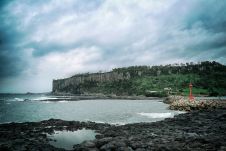Underwater Robots for Extreme Regions
The start of the first two-day scientific workshop at the MARUM-Center for Marine Environmental Sciences in Bremen, Germany, on Monday 4 February 2013 heralds the beginning of the operative phase of the new Helmholtz research alliance, 'Robotic Exploration under Extreme Conditions' (ROBEX). In this project space travel specialists and deep-sea researchers from 15 research institutions will be jointly developing technologies for robot systems capable of conducting independent missions on the moon and in the deep sea.
The dark side of the moon and the deep-sea regions of the world’s oceans belong to the most inhospitable places imaginable. While the temperature curve on the dark side of the moon regularly rises to over 130 degrees Celsius, only to drop again to minus 160 degrees Celsius, the deep sea with its darkness, high water pressure and temperatures from zero to 400 degrees Celsius is similarly most unfriendly to life and technology alike. For its part, the deep sea provides a largely unknown habitat full of surprises on our planet.
Research Cooperation
To make exploration possible, 15 German space and marine research institutions under the leadership of the Alfred Wegener Institute, Helmholtz Centre for Polar and Marine Research, have joined forces in the Helmholtz Alliance, 'Robotic Exploration under Extreme Conditions' (ROBEX). They wish to share their respective specialised knowledge with the aim of jointly developing robot technologies which are able to explore the moon and the deep sea independently and primarily over long periods. The researchers are faced with the same technical challenges in the exploration of both regions. Neither for the deep sea nor for the moon has a solution so far been found, for example, as to how robot systems can move and conduct measurements a year long on their own and independently without exhausting their batteries. The researches seek to learn from each other in this project and jointly develop new ideas.
Recognising and Avoiding Objects
During the first joint scientific workshop at the Centre for Marine Environmental Sciences (MARUM) in Bremen, the project participants now wish to give their partners from the other research field an insight into their own research and explain the status of space or deep-sea technology. Using joint core questions such as those concerning the exploration and examination of extreme habitats, new joint technology projects are to be developed. One wish is to develop a control unit for the autonomous deep-sea robot systems with which the device recognises any objects lying in its path, such as stones, and avoids them. In future these vehicles are to be able to find their own way over lengthy periods of time and in the best case scenario also learn from errors.
Sampling and Monotoring Pipelines
The range of uses for intelligent and independent robot systems is wide. In the future, robots will be able to independently take soil samples from deep-sea volcanoes or on the dark side of the moon, and help to minimise the risks of deep-sea exploration. For example, pipelines on the floors of the oceans or the foundations of offshore structures can be monitored over long periods of time. The ROBEX developments will lay an important foundation stone here.
Scientific Institutes
The Helmholtz Association is supporting the research alliance planned for five years with a total of 15 million euros. The same sum is being contributed by the scientific institutions involved. The project partners are as follows:
• Alfred Wegener Institute, Helmholtz Centre for Polar and Marine Research
• Five institutes of the German Aerospace Center (DLR)
• GEOMAR Helmholtz Centre for Ocean Research Kiel
• German Research Centre for Artificial Intelligence (DFKI)
• Centre for Marine Environmental Sciences (MARUM) at the University of Bremen
• Jacobs University
• Technical University of Munich
• Technical Universtiy of Dresden
• Technical University of Berlin, and
• Technical University of Kaiserslautern














